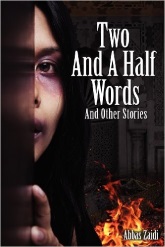Two and a Half Words and Other Stories
Abbas Zaidi
|
|
Those of us who labor at the juncture of our primary culture and the demands and obligations of living a diasporic life often lose sight of the fact that the mere act of inhabiting the metropolitan space has its attendant ramifications not the least of which is the unconscious investment in the demands and pressures of the metropolitan market itself. In such a scenario, the woks that we produce are overwritten by the expectations of a metropolitan audience as well as the mandates of metropolitan publishing industry. In this act of metropolitan cooptation of our most intimate thoughts about our culture, the outcome is often the sort of stories that, at the end of the day, privilege the metropolitan expectations. This was quite obvious in the recent issue of Granta on Pakistani stories: after reading it one wondered whether or not it is possible for Pakistani writers writing in English to escape the very stereotypes that mobilize the metropolitan perceptions of Pakistan. Abbas Zaidi’s stories, in a way, offer a native counter-response to this appropriation of native voices by the metropolitan publishing industry. The stories in this wonderful collection are not necessarily nativist, but they do represent experiences of characters who might be partially determined by a postnational globalized culture, but who also remain, at some level, quintessentially Pakistani. There is also a judicious mix of realistic tropes and magic realism: The magic realism, however, does not seem gratuitous but rather adds to the narrative drive and suspense of the stories and makes perfect sense within that logic. The collection starts with a story set in Multan—in the Saraiki heartland of Pakistan—and through the main characters and the introspective voice of our young narrator we not only learn the hidden secret about the sexual identity of the landlord but also the tensions involved in inter-Sectarian relationships. These relationships, however, are not offered as large binary structures but rather as elements of political rhetoric mobilized to buttress the elite claims to power. On the popular level—in the lives of the tenants—we find a cross sectarian solidarity: the rent enforcer happens to be an Ahmadi and has no problem with Shia tenants as long as they do not get him in trouble. This is Pakistani life caught within that liminal space and time: in the times of neoliberal capital and spatially located on the edges of a major city where the old zamindari system is being replaced by modern system of ownership. The students and workers living in Mr. Riaz Chaudhry’s building teach us about the strategies of coping and possibilities of lateral solidarities in the absence of a socialistic state. “Two and a half words” the title story, retells the history of a house located in the old Lahore: while the male characters in the story lament the losses suffered at the hands of a magical, evil woman, the reader understands that the true hero in the story is the woman/apparition who had been wronged and who had avenged herself by destroying the lives of her oppressors and gone on to visit her wrath on all others who sympathized with her oppressors. This is a story that needs more than a cursory knowledge of Lahore or Pakistani culture: a story such as this forces us to acknowledge that not all stories can be reduced and understood with the tools of western theory and that it is imperative on the critics to read the story with the assumptions and aspirations of its settings in order to make sense of it. Some of the stories in the collection are also set abroad: this abroad, however, is not the metropolitan west but that liminal space of modern capital: places like Borneo, not the west but still places that use, employ and sometimes exploit Pakistani labor. The last story is another enigmatic narrative of Pakistani community—mostly male—in a small town in Borneo and is told from the point of view of a fresh arrival who gets incorporated in the politics of this mini diaspora. The story also is a good example of the sheer sexism and sexual desires of all men as they think and talk about the only female character, Iqbal begum: A successful woman who earns her living and treats her husband as the appendage that he is. In its interesting climax we also learn that the husband-wife dynamics are not only about the binaries of reversed gender roles but also about the sexuality of the husband himself. On the whole, one finds in this collection, stories of young men obsessed with death, reporters playing their seedy role in the suicide bombing industry, corrupt landlords, perverted sexualities, and unjust power dynamics with a slight difference from the traditional fair offered in the west: these stories are written from within and the narrator/ author is deeply invested in these stories. The stories, therefore, come across to us not as arch or playful criticism of Pakistan offered from a safe perch in the west but as stories about a land and its people: critical, heart-breaking, and often cruel but all tempered with love. As a writer Abbas Zaidi himself is in that liminal space–he teaches at a technical college in Darussalam, Brunei– between the home and the new frontier of high capital and his stories also inhabit this space. This is a collection of stories worthy of our attention, our praise, and, most of all, our support. Abbas Zaidi has given us a loving, complex, and original portrayal of Pakistan: we must open our hearts and minds to receive this gift. Masood Ashraf Raja | 2011 | Pakistaniaat
Postcolonial Insanity |


 Abbas Zaidi
Abbas Zaidi